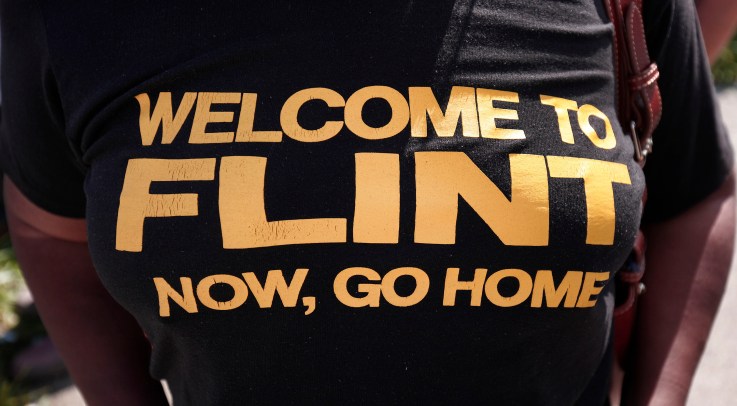
The Midwest is back! At least, that’s the conclusion from a group of venture capitalists who went on a multi-day bus tour through the region recently. As Kevin Roose wrote in the New York Times this week, “The trip, which took place on a luxury bus outfitted with a supply of vegan doughnuts and coal-infused kombucha, was known as the ‘Comeback Cities Tour.’”
Roose writes in a sly tongue-in-cheek fashion, and for good reason: the whole trip is and was an obnoxious affectation of coastal elites gawking at poverty in America’s heartland. VCs were beside themselves at what they were seeing according to Roose. “This is nicer than San Francisco” said Robin Li of GGV Capital, looking at a co-working space in downtown Detroit. “If it weren’t for my kids, I’d totally move,” said Cyan Bannister of Founders Fund.
I call this an obnoxious affectation, because there is this blissful stereotype of California as an economic nirvana and the Midwest as some sort of deindustrialized death trap. Unsurprisingly, that stereotype panned out given where the Comeback Cities Tour actually visited: Youngstown, Akron, Detroit, Flint, and South Bend, Indiana. This isn’t a tour of the Midwest so much as poverty tourism.
VCs don’t need to wait in the Centurion Lounge at SFO in order to catch a glimpse at crushing poverty — all they have to do is look in front of their homes in San Francisco to see the homelessness and deprivation, or maybe travel just a few minutes east to cities like Stockton, Vallejo, and Richmond, which are teetering on bankruptcy (or in the case of Stockton, has actually gone bankrupt).
The Midwest certainly has deindustrialized, and some of the most troubled cities in the country are located there. However, the Midwest is also home to some of the most robust economies as well. Take one choice statistic — the unemployment rate — and look at the Midwest. One thing that becomes obvious is that the Midwest is heavily represented in the cities with the lowest unemployment rate — Ames, Iowa is leading the entire country with a rate of 1.5%, compared to 3.9% nationwide. Madison, Wisconsin comes in at fifth with 1.9%, and other cities show comparable performance.
The Comeback Cities tour could have focused on the success stories — the cities that are actually building thriving innovation economies. It could have stopped in places like Minneapolis and Rochester, Minnesota, which together have a world-leading biotech cluster. It could have stopped in Chicago, a global city with a multitude of startup unicorns to its name. It could have stopped in Indianapolis or Pittsburgh or Ann Arbor, each of which have notable innovation clusters.
Additional VC dollars in any of those markets would have an outsized and extraordinary impact in accelerating the growth of those startup ecosystems. But no, the VCs on this trip didn’t focus on cultivating the winners (which ironically, is what VCs literally do in their jobs every single day). Instead, they traveled to cities that can’t even supply tap water without killing people in some sort of messianic belief that they are going to Solve It With Tech. Flint doesn’t need a startup accelerator: it needs basic first-world utilities and a functioning government.
I know some of the people who went on this tour personally. I know that everyone involved has their heart in the right place, and I am not questioning anyone’s motives here. I do believe that everyone involved is legitimately looking for new startup opportunities and increasingly frustrated with San Francisco’s insular culture.
But let’s not fool ourselves into believing that a WeWork and a local seed fund is suddenly going to turn cities down on their luck around. Unlike a factory, a WeWork doesn’t produce anything — the people located inside that WeWork create things. The challenge with innovation work is that it requires the most investment in human and urban capital. Building innovative talent requires decades of education and training, and a robust knowledge-producing infrastructure including universities, research centers, accelerators, incubators, think tanks, and more.
My fear is that with all things in American politics today, there is this political desire for the quick fix. Detroit can be solved with some startup funding, and we don’t need to worry about crumbling schools or endemic government corruption. We don’t need to fund K-12 schools or universities, we’ve got VCs knocking on our door! And nothing could be further from the truth.
I was born in Youngstown, but grew up predominantly near Minneapolis. My immediate family lives outside Detroit, and my extended family lives outside Akron. I am acutely aware of the challenges that the region faces, but also the opportunities that it can afford people. My simple plea is to focus on what works. Focus on the cities that are thriving and help them reach ever higher echelons of growth. Help more people to migrate to those epicenters of excellence so they can participate in that growth and share in the prosperity. The Midwest doesn’t need to be discovered — it’s already here, and it just needs to be cultivated.
Featured Image: Bill Pugliano/Getty Images



